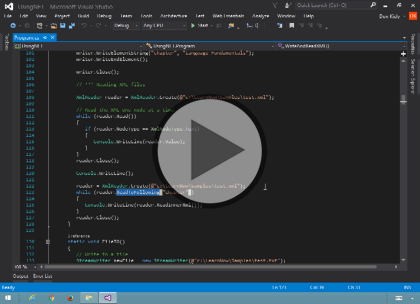Course description
The .NET framework is a collection of thousands of rich objects you can use in your code, and it’s one of the compelling reasons to use C#. Using .NET classes can save you a lot of work in providing basic infrastructure to your C# applications. In this course, you’ll learn about some of the many classes and objects the .NET framework, as well as more sophisticated techniques for using some of its more advanced data types. In particular, you’ll learn about the support the .NET framework provides for working with strings, files, and dates.
Prerequisites
This course builds upon: Programming C# 6: Getting started, Your First App, Projects and Syntax and Variables and Data Types.
Learning Paths
This course is part of the following LearnNowOnline SuccessPaths™:
.NET Framework C# Development
Meet the expert
Don Kiely is a featured instructor on many of our SQL Server and Visual Studio courses. He is a nationally recognized author, instructor, and consultant specializing in Microsoft technologies. Don has many years of teaching experience, is the author or co-author of several programming books, and has spoken at many industry conferences and user groups. In addition, Don is a consultant for a variety of companies that develop distributed applications for public and private organizations.
Course outline
XML and File I/O
.NET Framework Classes (22:45)
- Introduction (01:00)
- Using .NET Framework Classes (03:30)
- Demo: Random Numbers (05:33)
- Demo: Debugging (04:04)
- Getting Info about Computers (01:14)
- Demo: Environment (03:15)
- Demo: Instance vs. Static (03:38)
- Summary (00:28)
Working with XML (14:13)
- Introduction (00:38)
- Demo: XMLWriter (04:50)
- Demo: Writing XML (02:54)
- Demo: Reading XML (05:18)
- Summary (00:30)
File Input and Output (19:36)
- Introduction (00:39)
- Demo: StreamWriter (04:02)
- Demo: Writing to Files (05:30)
- Demo: Directories (02:15)
- Demo: Debugging (03:40)
- Getting Info from Drives (01:37)
- Demo: DriveInfo (01:17)
- Summary (00:33)
Strings and Dates
Working with Strings (05:29)
- Introduction (00:34)
- Working with Strings (01:07)
- Fields & Properties of Strings (00:32)
- Demo: Strings (02:50)
- Summary (00:24)
Methods of String Class (20:46)
- Introduction (00:19)
- Demo: String Comparisons (05:00)
- Demo: Searching Strings (02:56)
- Demo: Editing Strings (04:18)
- Demo: Leading & Trailing Space (03:11)
- Demo: Extract Strings (04:39)
- Summary (00:19)
Formatting Strings (07:58)
- Introduction (00:57)
- Formatting Strings (00:35)
- Demo: Formatting Strings (02:59)
- Format Specifiers for Dates (00:55)
- Demo: Date Format Specifiers (01:59)
- Summary (00:32)
Using StringBuilder (11:57)
- Introduction (01:00)
- Demo: Concatenating Strings (01:39)
- Using the StringBuilder Class (01:34)
- Demo: StringBuilder (04:27)
- Demo: Insert & Replace Strings (02:48)
- Summary (00:26)
Working with Dates and Times (11:32)
- Introduction (01:00)
- Demo: Dates and Times (01:50)
- System.DateTime Structure (00:50)
- Demo: Now (02:25)
- Demo: DateTime Methods (01:37)
- Methods of DateTime (03:26)
- Summary (00:21)
Using TimeSpan Structure (09:33)
- Introduction (00:52)
- Using the TimeSpan Structure (00:57)
- Demo: TimeSpan (04:21)
- Demo: Calculating with TimeSpan (02:45)
- Summary (00:36)



